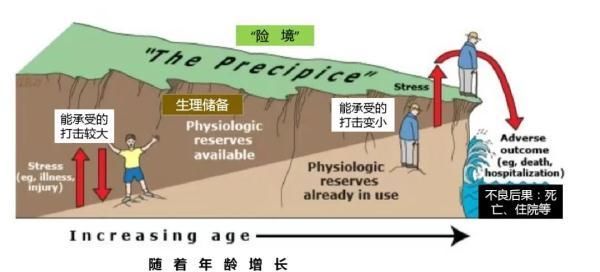This article is reprinted from: Guangming.com
As the saying goes, “seventy don’t stay overnight, eighty don’t stay, and ninety don’t stay.” It means that after getting older, various diseases are easy to come to your door, and the risk of physical accidents increases.
Indeed, it is a natural law for the human body to age with age. The rate of aging is influenced by genetic, lifestyle and environmental factors.
So, why do the elderly have poor disease resistance? Let’s listen to what Lv Jihui, director of the Second Department of Psychology and Psychology at Beijing Geriatrics Hospital, has to say
What is a body’s “health account”
We can compare our body’s physiological reserves to a “health account” , which is medically referred to as “homeostatic reserve”. Maintaining homeostasis by maintaining a healthy account balance is a dynamic process.
Anything that is good for your health can increase your account’s reserves, while factors that are detrimental to your health, such as an unhealthy lifestyle, can deplete your reserves.
Aging itself is a kind of chronic consumption.
Generally speaking, from maturity to aging, the elements that are drawn from this health account to maintain the normal functioning of the body increase; ” the physiological reserve gradually diminishes.
The graph below shows how steady-state reserves decline with age. In order to maintain a steady state, the elderly have used their physiological reserves to the greatest extent, and can not even bear the smallest harm, it is a state of frailty.

Elders become weaker with age, and their ability to resist various unexpected blows becomes worse. getting weaker.
You see, at the end of the graph, even the smallest blow can overdraw the available reserves, causing the old man to fall off a cliff and enter a “dangerous situation.”
These unfortunate events, known as “dangerous situations,” include death, cardiac arrest, hospitalization, confusion, and incontinence. Sometimes a small cold can knock down an old man who usually seems to be in good health.
Why older people can’t stand the wind and rain
A study compared younger patients with older patients who also suffered cardiac arrest Acute physiology assessment scores (the higher the score, the farther the health indicators deviate from normal), were significantly higher than those in the elderly group.
The results of this study suggest that older adults require a smaller deviation from steady state for cardiac arrest. That is to say, a slight disturbance and slight deviation can lead to adverse events in the elderly, while the young people have a stronger ability to resist.
For example, young and middle-aged people have pneumonia, urinary tract infection, peptic ulcer, etc., and most of them can be cured with proper treatment. If the elderly suffer from the above diseases, not only the recovery is slow, the recurrence is easy, and the mortality rate is high, but it may also cause brain dysfunction, manifested as confusion and delirium.
This is due to the systemic reaction caused by somatic diseases or therapeutic drugs, which leads to the depletion of the “anti-confusion reserve” of the brain of the elderly, which can easily destroy the homeostasis and enter the “dangerous situation” of delirium.
In short, the obvious loss of the physiological reserve of the elderly (the bottom of the health account) makes them unable to withstand minor blows, thus becoming debilitated, more susceptible to many diseases, and more difficult to recover.
How to increase the reserve of “health account”
On the one hand, we should try to do more things that are beneficial to the body, such as reasonable diet, physical exercise, educational training, healthy social interaction, etc. , to increase the reserves of the health account.
On the other hand, by eliminating factors that are harmful to the body, such as smoking, alcoholism, staying up late, middle-aged obesity, and vascular risk factors, to reduce unnatural wastage, in order to delay frailty and maintain health as much as possible.
Consider how your own and your family’s health accounts are billed and spent. Do you know what to do?